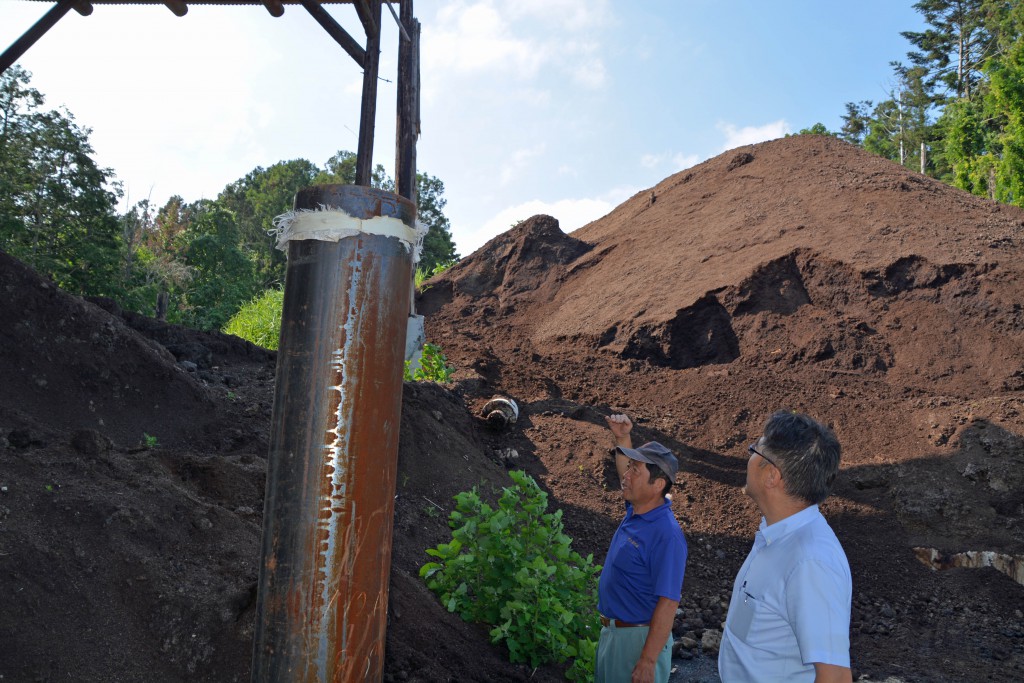
A photo shows manure piled up like a mountain at a farm in Koriyama, Fukushima Prefecture, hindering the farm’s operat
Yuma Ida
Cattle breeders in some parts of Fukushima Prefecture are at a loss as to how to cope with the accumulation of cattle manure, because they are having difficulty selling them as fertilizers due to harmful rumors related to the Fukushima No. 1 nuclear power plant.
The Fukushima prefectural government has been working with Tokyo Electric Power Co. to distribute manure with radiation levels below the government’s safety limit, but the moves are hindered by TEPCO’s failure to come to terms with transportation firms on distribution charges amid shortage of drivers and soaring fuel prices.
Farmers’ criticism towards TEPCO is growing as they are worried that piles of manure near their barns could have adverse effects on the health of their cattle.
Kazuo Ueno, 65, who runs a farm with 2,000 beef cattle in Koriyama, Fukushima, has roughly 6,000 tons of manure piled up sky-high near his cowsheds. He used to store manure in a roofed facility, but the facility collapsed due to continuous accumulation of manure after the March 2011 disaster and the heavy snow which pulled down its pillars in February. Now the manure is left out uncovered in the open.
In Ueno’s farm, 20 tons of excrement is produced every day. After going through fermentative treatment and made into a compost, it is accumulated at a pace of 360 tons per month. It is even piled up inside the cowsheds, causing methane gas emissions, which could lead to cattle’s health hazards and decline in meat quality, as well as risks of self-ignition because of heat produced by bacteria fermentation.
“We can raise our cattle properly only if the manure is taken care of,” says Ueno with his shoulders dropped.
Ueno and his 65-year-old wife Michiko, who began raising two beef cows 40 years ago, have been engaged in cattle breeding since then. They had to build a new facility to handle manure and are now forced to draw from their savings to run their farm. “How long do we have to go on like this?” Michiko says angrily.
As for composts produced within the prefecture with radiation levels which exceed the safety standard of 400 becquerels per kilogram, the government is considering incinerating them to reduce volume and storing them in interim nuclear waste storage facilities scheduled to be established in the towns of Okuma and Futaba. Currently, 92,800 tons of such composts are temporarily placed in lands owned by farmers and local governments.
Composts with radiation levels below the safety limit can be marketed as organic fertilizers, but demand for such composts remain sluggish as farmers are reluctant to use Fukushima-made composts. In order to promote sales of the composts, the prefectural government began a project in March last year to search buyers, with TEPCO cooperating by signing outsourcing contracts with shipping companies and bearing distribution costs.
According to the prefectural government, only 30,000 tons out of 100,000 tons of composts accumulated in Fukushima were sold under the project in the first year, prompting local authorities to extend the project for two more years.
Prefectural government officials attribute the slow progress to the fact that the project was not well spread in the local communities. However, some sources blame TEPCO, which they say failed to come to early agreement with transport companies on delivery charges.
Moreover, under the project, when transport firms refuse to do the loading work, farmers must provide machinery or entrust it to other companies and bear the expenses. Ueno, who bears the cost of loading manure onto trucks, says the project is not designed to help cattle breeders who cannot afford to pay for extra manpower or facilities.
TEPCO spokesman said the company is not aware of such complaints from farmers, adding that they will proceed with the project focusing on the central district of the prefecture where the handling work of manure was relatively slow in the first year.
(Aug. 5, 2014)

